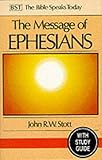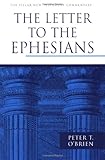 This is my second reading of this volume in the Bible Speaks Today series, and it was just as enjoyable as I remembered it being first time round. All of John Stott’s contributions are excellent, and this is one of his best.
This is my second reading of this volume in the Bible Speaks Today series, and it was just as enjoyable as I remembered it being first time round. All of John Stott’s contributions are excellent, and this is one of his best.
Published originally in 1979, this volume is slightly different from others in that there is no introduction. I actually think this is a good move, as Stott deals with issues of authorship, dating, recipients in his comments on the opening verses and draws out key themes of the letter as he goes along.
Perhaps the biggest eye-opener for me (the first time through anyway) was recognising the theme of “God’s new society”. We have become so accustomed to reading the Bible individualistically that we can miss the implications for the church community. Instead of interpreting the blessings and commands in an entirely personal way (“what do I get, how should I behave”), Stott does a brilliant job of highlighting the corporate emphasis running through the letter.
The one place I found myself disagreeing with Stott (or at least wanting to say “yes, but…”) was in his discussion of the “Ephesians 4 ministries”, in which he made clear his reservations about the charismatic movement’s understanding of the need for ongoing “apostolic” and “prophetic” ministries. He makes clear that in his estimation, by far the most important gift is that of teaching. I agree with its great importance, but it seems to me that he undermines the very point he has just made so forcefully about the need for a diversity of gifts.
He devotes considerable space to the contentious issue of submission, arguing that there is indeed a creation principle of male ‘headship’, but is very careful to explain what is not meant by this.
“Certainly, ‘headship’ implies a degree of leadership and initiative, as when Christ came to woo and to win his bride. But more specifically it implies sacrifice, self-giving for the sake of the beloved, as when Christ Gave himself for his bride. If ‘headship’ means ‘power’ in any sense, then it is power to care not to crush, power to serve to not dominate, power to facilitate self-fulfilment, not to frustrate or destroy it.”
In fact if anything, Stott’s commentary on Eph 5:21-6:9 focuses more on what the text is not saying than what it is. For example, he includes a section explaining why the NT does not explicitly call for the abolition of slavery.
Though this is not an academic commentary, Stott is not afraid to get involved in exegetical debates where necessary. For example, he spends several pages surveying the history of the idea that the “powers and authorities” are not demons but socio-political structures. His thoughtful critique of the position (which is still popular) concludes that it is “ingenious” yet “contrived”.
“in reaffirming that the principalities and powers are personal supernatural agencies, I am not at all denying that they can use structures, traditions, institutions, etc. For good or ill; I am only wishing to avoid the confusion which comes from identifying them. … Advocates of the new theory warn us against deifying structures; I want to warn them against demonizing them.”
Stott also makes good use of the best quotes from other commentators, which makes this a rich treasure trove of source material for those preaching on Ephesians. It contains a marvellous combination of careful exegesis and pastoral wisdom, which makes it an excellent choice for anyone wanting to study the book of Ephesians in greater depth.

